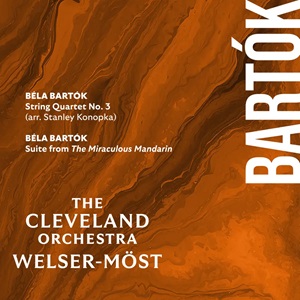
Béla Bartók (1881-1945)
String Quartet No 3 (arr. for double string orchestra, Stanley Konopka)
The Miraculous Mandarin – Suite
Cleveland Orchestra/Franz Welser-Möst
rec. live, January 2024, Mandel Concert Hall, Severance Music Center, Cleveland, USA
Reviewed as streamed MP3 files from a press preview
Download only
The Cleveland Orchestra TCO0011D [34]
No one could accuse the Cleveland Orchestra’s own label of playing it safe with repertoire choices in its initial releases. It is not often you will come across a recording by a major orchestra of a complete Bartók string quartet arranged for string orchestra. Whilst The Miraculous Mandarin makes more frequent visits to the studio, it is usually in the form of the complete ballet these days rather than the once more popular suite that we get here.
In reviewing the most recent release by Franz Welser-Möst and his stupendous band, that of the safest of safe choices of Tchaikovsky Symphony No 4, I lamented a serious mismatch between composition and conductor. I had initial fears about this Bartók disc. Even for a composer who retains a (largely unjustified) reputation for fearsome modernity, the Miraculous Mandarin is seen as his peak of uncompromising ferocity. I adore Bartók, yet even I wondered if the opening of the suite lacked guts. Welser-Möst seems constitutionally incapable of conducting for the thrill of the passing moment, but must instead have his eyes off the overall shape of the work. He isn’t interested in intimidating the listener with a Rite of Spring style shock of the new. Everything is precise and transparent, almost as if he were directing Debussy. A bit too well-mannered? Well, perhaps, but as I listened I began to value what the Austrian conductor was up to. I hadn’t, for example, previously noticed how lightly scored that opening is and it provoked the thought that maybe everyone else had been getting this passage wrong by forcing it to be something it wasn’t.
The Cleveland Orchestra is currently in sensational shape and, as the final Chase amply shows, it can blaze when it wants. Indeed, as successive multicoloured textures pass by the listener, it is very clear that they can do pretty much whatever they fancy and they are aided by sound of real depth and transparency. The conclusion is that if the very opening of the suite doesn’t go for the jugular, then that is how Welser-Möst wants it. The shorter, punchier suite allows the Austrian to carefully build tension and the cumulative effect is pretty stunning. But it is the range and vibrancy of Bartók’s inspiration that is the real winner here. No recording of this piece, either complete or of the suite, has impressed upon me quite how much delicate and lyrical music it contains. Listen to the seductive oboe of the Second Decoy Game and the gloriously ripe blossoming of the same melody on the strings that follow. This is Bartók overflowing with sonic delights.
The recording of the quartet ranks as a curiosity and, as with some recent Cleveland releases, must count as a showcasing of the orchestra’s strings. They have a right to boast. In many cases, the tightness of their ensemble would put actual string quartets to shame. Not that this is an especially wild take on one of Bartók’s most notorious scores – no surprises there, given the conductor’s values! This is a ripe conception of the piece, with its debt to Berg’s Lyric Suite – recently released by these same performers – to the forefront. If I were to liken it to recordings by actual string quartets, it is more Takács than Tokyo String Quartet. Inevitably the bigger body of sound rounds out some sharper edges, but that makes it a little more accessible, which is no bad thing. The result is a work much closer to the Music for Strings, Percussion and Celesta or the grossly underrated Divertimento.
This is not the most visceral version of either score (though in the quartet it pretty much has the field to itself). But with both performances, I was left not just with a deeper appreciation of Bartók’s genius, but also with a desire to listen again and again in order to discover new treasures. If a single recording can challenge the image of Bartók as a kind of musical thug making nasty, iconoclastic noises, then this is it. But the ultimate praise I can bestow is much simpler – I just couldn’t get enough of listening to this record.
David McDade
Buying this recording via a link below generates revenue for MWI and helps us keep free access to the site



















